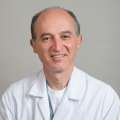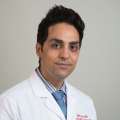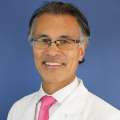In January of 2021, the UCLA heart transplant program reached its 2,500th heart transplant surgery – only the second heart transplant program in the U.S. to achieve this milestone.
It’s “a testament to the depth of experience in this program,” says Abbas Ardehali, MD, FACS, professor of surgery and medicine in the Division of Cardiothoracic Surgery at UCLA, and director of the UCLA Heart, Lung, and Heart-Lung Transplant Programs. “UCLA has shaped the way heart transplants are done throughout this country and around the world.”
What make the UCLA heart transplant program world-class are the expertise, the impressive patient outcomes – such as below national average transplant rejection rates and low mortality on the wait-list – and the use of innovative treatments, Dr. Ardehali says.
Since its founding in 1984, it has ranked among the top transplant programs and in 2010, was named the nation's best heart transplant program, by the Health Resources and Services Administration, an agency of the U.S. Department of Health and Human Services.
The multi-disciplinary team is comprised of surgeons, cardiologists, nurses, physical therapists and specialists from several fields, such as infectious disease, nephrology, immunology and more.
“We have the knowledge base and the resources to take care of the patients who are otherwise deemed not suitable candidates at other centers,” Dr. Ardehali says.
These are patients who may have been turned down from other centers, have complicated anatomy, have had multiple prior surgeries, were born with congenital heart disease, or need multiple organ transplants.
Patients are referred to the program from local, regional, national and even international centers from around the globe.
Ali Nsair, MD, medical director of the program, says the fact that patients travel great distances to get treatment at UCLA reflects how well the program manages patient care.
UCLA’s team pioneered research leading to higher rates of survival in heart transplant recipients and better rejection outcomes, and have been at the forefront of breakthrough clinical trials.
In 2010, UCLA led a multi-center phase 2 clinical study of an experimental organ-preservation system, called “Heart in a Box.” This system allowed donor hearts to continue functioning in a "beating" state outside the body during transport.
Since the advent of transplantation, the heart would be placed in a cold solution for preservation during transport, only effective for a window of less than six hours. With the “heart in a box” technology – which perfuses the heart with warm, nutrient-rich donor blood – the organ may be kept outside of the body for a longer period of time.
In 2014, a UCLA-led study determined that a blood test could predict organ-rejection issues. The test, AlloMap, was developed by Mario Deng, MD, and is used at 90% of transplant centers.
Additionally, the UCLA heart transplant program extends care from pediatrics to adulthood.
“Patients who are born with congenital heart defects go through a lot of corrective surgeries over the years,” Dr. Nsair says. “Once they get into adulthood with their native heart, some of them end up needing a heart transplant. We offer patients and their families the full spectrum of care, here at UCLA.”
Now in its 37th year, the program continues to evolve, Dr. Ardehali says.
“We are incredibly proud of the history, but are razor focused on what the future holds,” he says. “I believe the future of heart transplantation at UCLA is bright with new advances, new therapies and new ways of taking care of patients with advanced heart disease.”
One of the program’s core missions is to provide training to the next generation to continue advancing the field. The Division of Cardiothoracic Surgery offers competitive one to two-year clinical fellowships in adult cardiac surgery, pediatric cardiac surgery, and heart transplantation.
Dr. Nsair, who trained through the heart failure fellowship, says, “as an academic center, our job is to ensure that knowledge is shared across researchers and trainees so that they can take their expertise into their communities.”
The team has innovated to overcome unique challenges – including those presented by the coronavirus pandemic. Dr. Nsair says the heart transplant team was among the first programs to develop a telehealth infrastructure to manage patients in a virtual setting.
Despite the pandemic, the program conducted 63 heart transplant surgeries in 2020. “Our program continues to grow in quantity, but also in quality,” Dr. Nsair says. “Behind every heart transplant surgery is a family that has been given a second chance.”






